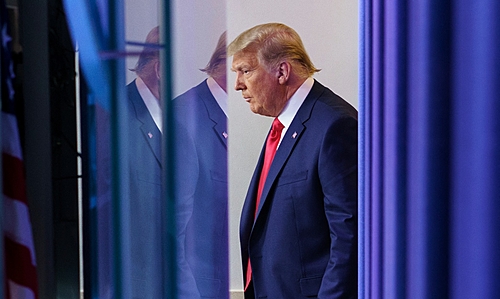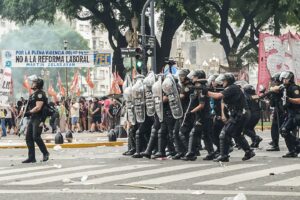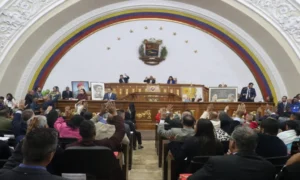
Donald Trump has been indicted… again. This time, the former president is accused of 4 federal crimes that are linked to the attempts of the former president of the United States to remain in power even after being defeated at the polls.
The charge, formally filed in Washington, DC, last week, is considered the most serious so far against the Republican. Dante Scala, professor of political science at the University of New Hampshire, spoke to the Brazil in fact about the subject:
“I think it’s possible that this indictment will have more serious effects than the previous ones,” Scala said, “of the 3 we’ve seen so far, this is the most central to American democracy. I think, as a result, there’s potential there for it to have an effect on Trump’s chances of becoming the Republicans’ choice, although I think it’s going to take a while for that to show up.”
So far, however, Trump has only risen in the polls after the previous indictments, pulling far ahead of rival Ron DeSantis, the runner-up in polls for the Republican primary.
Days after the indictment, in an interview with NBC NewsDeSantis claimed, for the first time, that Trump had lost the 2020 election. A change in campaign tactics aimed at hurting the former president with the third indictment.
“Republican voters are not hearing dissenting opinions from other Republican elites about Donald Trump and in particular about his behavior after the 2020 election,” says Scala.
Check out the video report:
For the professor, Republicans are to blame for Trump’s survival: “Republicans had the chance to condemn Donald Trump in 2021, and most decided not to. They could have ended his career there, but they didn’t. And that sent a signal to Republican voters.”
In addition to being allegations of federal crimes, as in the case of Miami, the one in Washington could have an even greater impact on Trump’s aspirations to return to the White House. If convicted, some experts believe he could be covered by the Fourteenth Amendment to the country’s constitution, which bans the right of convicted persons to hold positions of power in the state.
But this prohibition is not automatic, it is not clear and it is far from being a consensus. Samuel Issacharoff, professor of law at New York University, finds it unlikely that Trump would be barred from serving as president, if elected.
“It is clear that the reconstruction amendment, the 14th amendment, passed after the end of the Civil War, was intended to prevent former insurgents, the South in the Civil War, from being elected to office through the electoral process,” Issacharoff told the Brazil in factthat the language “means that incitement to insurrection may prohibit someone from holding office at the federal level”.
The jurist, however, has a caveat: “but this was never applied. It is extremely difficult to see how this would be enforced if there is no condemnation or indictment on the issue of insurrection.”
On Thursday, in Washington, Trump was released to respond in freedom with two conditions: not to commit crimes and not to get involved with the characters included in the indictment.
Over the weekend, however, the former president followed the same line taken in previous indictments. In your social network, Truth Socialthe Republican attacked the judge in charge of the case, Tanya Chutkan, the prosecutor Jack Smith and former vice president Mike Pence.
The situation raised questions about whether Trump had not violated the condition stipulated by the judge, which could lead to a preventive detention.
“It is unlikely that he will be arrested for this,” said the NYU professor, “it is possible that he will be subpoenaed to suspend certain activities. He has the right to denounce the judge. Unfortunately, that is part of the American First Amendment tradition.”
The next hearing on the case will take place on August 28, when a trial date will be set. The prosecution has already said it wants a speedy process, to happen before next year’s election.
But the former president’s legal problems are far from over. In Atlanta, Georgia, a grand jury is expected to decide in coming weeks on a possible fourth indictment against the Republican. The case also concerns attempts to overturn the result of the 2020 election.
During the days of the count, Trump made a call to the then Secretary of State of Georgia asking him to find just under 12,000 votes, which would give him victory in the state. The call was recorded and released by the Secretary of State himself the next day.
Issacharoff commented: “This is blatant election fraud. If they manage to establish that, then he’s responsible. There is no immunity, as a candidate, to interfere in the electoral system”.
In the case of Georgia, if the indictment is filed, and Trump is convicted, not even a presidential pardon would solve the situation, since it is a state investigation.
Samuel Issacharoff highlights the difficulty of US institutions in dealing with Trump’s crimes, and believes that Brazil has a much greater capacity in relation to Bolsonaro:
“The differences between the US and Brazil right now is that Brazil seems to have better institutions. The judiciary is stronger in Brazil, the electoral institutions are more centralized, stronger, and they dealt with the challenges of the 2022 election better than ours with the 2020 election. So we are in a difficult situation”.
Editing: Rodrigo Durão Coelho
Source: www.brasildefato.com.br

